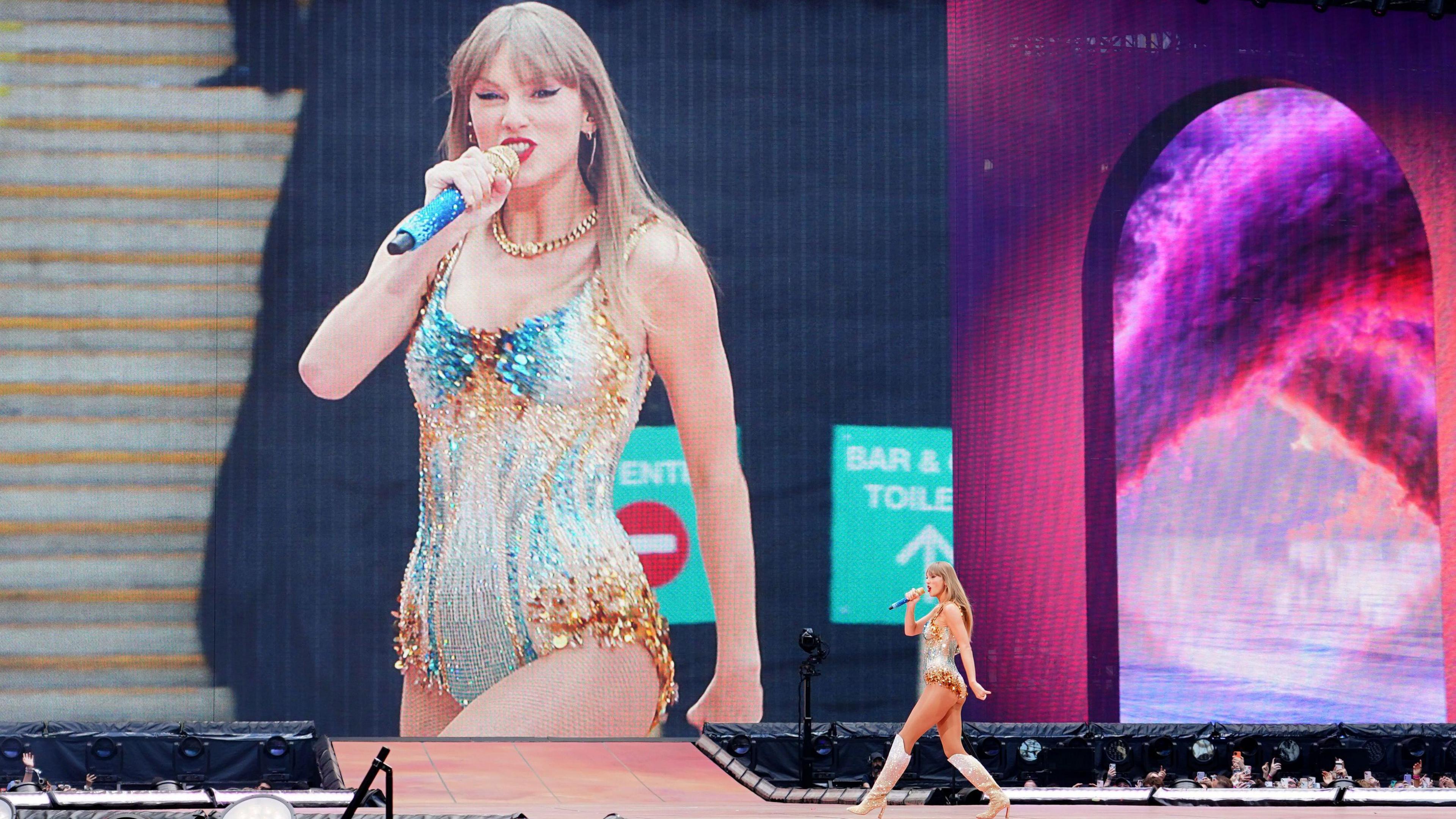StomaBabe 'treated with contempt' at Taylor gig

Holly Fleet said she felt she couldn't drink or move during the concert
- Published
A woman with a chronic illness who uses a stoma bag said she felt she could not "drink or move" during a Taylor Swift concert after members of the crowd criticised and "shoved" her for doing so while she was there.
Journalist and content creator Holly Fleet, 30, who has ulcerative colitis, external and is known online as StomaBabe, said in a post on X, external she was "treated with contempt" whenever she went back to her spot in the crowd at the London show despite explaining she had a medical condition, and was "continuously shoved" by a parent for refusing to remove a backpack containing medical supplies.
She also said Wembley Stadium failed to provide advice to her before the event about bringing in medical supplies and drinks, and did not have enough accessible toilets available during the concert.
A stadium spokesperson said they were sorry to hear about Ms Fleet's experience, adding Wembley was "committed to providing an inclusive experience for all disabled guests".

Taylor Swift played three times at Wembley Stadium last month
Ms Fleet, from north London, said she bought a VIP standing ticket for the 22 June gig because she did not think a disabled seated ticket would be available due to how popular Taylor Swift is.
She told BBC London she needed to empty her stoma bag regularly, and to drink often because the operation she had had meant she was susceptible to dehydration.
She said at previous gigs it had not been so hard "to get in and out" and she "didn't think people would take too much offence to it" - especially given that Swift's set would be several hours long.
However, Ms Fleet said when she went to get drinks and brought them back "I must have had about four different people have a go at me about that".
She also said she was shoved repeatedly by two women in front of their children because she had a backpack on containing her medical supplies.
"I had my backpack on. One of them taps me on the back and was like, 'can you take that off please?' and I said: 'No, it's got medical supplies in so I can't take it off'... The next thing you know, she was just shoving me... really pushing me. And these were two mums who were both with their teen daughters."
Ms Fleet claimed when she turned around to ask what the problem was, the woman laughed at her and then carried on shoving her, making her feel "really upset".
"I had to move behind them because I couldn't put up with being shoved like that," she said.

Ms Fleet says she cried when she got home
"I felt like from every angle - I can't have a drink, I can't have my backpack on, I can't go to the toilets. Everything felt so awful," she said.
"I felt like I couldn't drink, I couldn't move."
Ms Fleet, who also has ADHD, said she eventually "felt so overwhelmed by the whole thing that I literally ended up just phasing out".
She said although she kept a hidden disabilities sunflower lanyard on as she was going to and from the toilet, a woman had an issue with her returning to her position with her friend, telling Ms Fleet "we've been here for hours" and accusing her of being "disgraceful".
"I did get a bit depressed when I got home, I did cry and stuff because I thought, 'is this how it's always gonna be for me now, am I always gonna experience this?' I might not be able to go to concerts again now."
Taylor Swift fan gifted star's hat at Wembley gig
- Published26 June 2024
Taylor Swift fans are Enchanted at Wembley Stadium
- Published22 June 2024
Ms Fleet also complained there was a lack of information on the Wembley website about whether bags containing medical supplies and liquids would be allowed into the stadium, such as the rehydration drinks she needs after her operation.
She said that despite contacting Wembley's accessibility team with questions she never received a response. A spokesperson for the stadium said that Ms Fleet was sent automatic reply via email linking to the website's FAQs section, which asked people to get back in touch if their query was not answered - which she did not do.
Ms Fleet also said there was "one disabled toilet near my section and the queue for that was insane", with people without special keys to access the disabled toilets "holding the door open" for each other and people banging on the door shouting at her to hurry up.
She is encouraging people to have more respect for each other at concerts, and is asking venues like Wembley to offer better communication for people with additional needs or disabilities, including how long queues outside are likely to be and to provide contact phone numbers rather than just an email address.
'We pride ourselves on being inclusive'
A spokesperson for Wembley Stadium said: “We would urge all our guests who might require specialist help or assistance, to contact our customer engagement team who are fully trained in disability awareness and have undertaken specific training to support all of our guests.
“Wembley Stadium is committed to providing an inclusive experience for all disabled guests, regardless of whether their disability is visible or non-visible."
They added that the stadium had three Changing Places facilities and 147 accessible toilets and had been adapted to make it "accessible to all".
“We pride ourselves on being an inclusive stadium," the spokesperson added.
“We also work with expert partners and specialist user groups to provide a range of services and facilities which can be accessed by guests with specific requirements."
Similar stories
Wireless 'a waste of money' for disabled fans
- Published4 July 2022
'Inaccessible disabled loos mean I can't drink at festivals'
- Published26 August 2023
Wheelchair user 'trapped in flat' after lift breaks
- Published27 June 2024
Blind woman and guide dog kicked out of hotel
- Published10 November 2022
Related links
Listen to the best of BBC Radio London on Sounds and follow BBC London on Facebook, external, X, external and Instagram, external. Send your story ideas to hello.bbclondon@bbc.co.uk, external